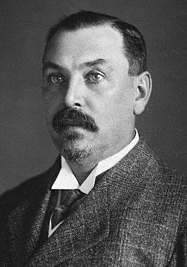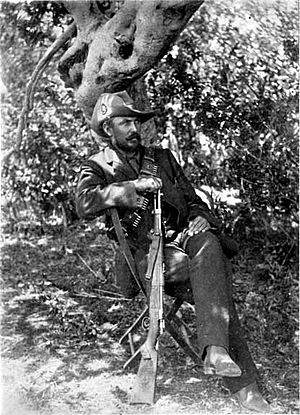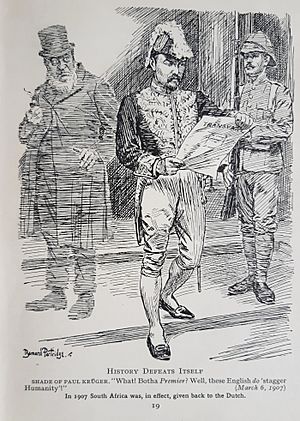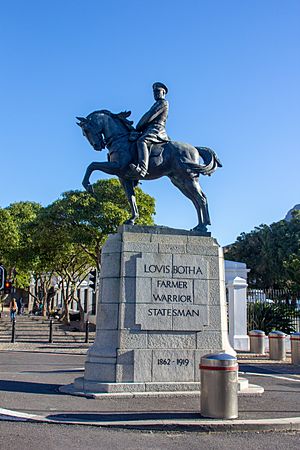Louis Botha facts for kids
Quick facts for kids
General The Right Honourable
Louis Botha
|
|
|---|---|
 |
|
| 1st Prime Minister of South Africa | |
| In office 31 May 1910 – 27 August 1919 |
|
| Monarch | George V |
| Governor-General | The Viscount Gladstone The Earl Buxton |
| Preceded by | Office established |
| Succeeded by | Jan Christiaan Smuts |
| Prime Minister of the Transvaal | |
| In office 4 March 1907 – 31 May 1910 |
|
| Monarch | Edward VII George V |
| Governor | The Earl of Selborne |
| Preceded by | Office established |
| Succeeded by | Himself As Prime Minister of South Africa |
| Personal details | |
| Born | 27 September 1862 Greytown, Colony of Natal |
| Died | 27 August 1919 (aged 56) Pretoria, Transvaal, Union of South Africa |
| Resting place | Rebecca Street Cemetery, Pretoria, South Africa |
| Political party | South African Party |
| Other political affiliations |
Het Volk Party |
| Spouse | Annie Emmett |
| Profession | Career military officer, politician |
| Signature |  |
| Military service | |
| Allegiance | |
| Years of service | 1899–1902 (Transvaal Commandos) 1902–1919 (British Imperial Armies) |
| Rank | General |
| Commands | Boer, South African Republic |
| Battles/wars | Second Boer War: –Colenso –Spioen kop – Retreat from Pretoria First World War: –South-West Africa Campaign |
Louis Botha (born 27 September 1862 – died 27 August 1919) was a very important South African politician. He became the first prime minister of the Union of South Africa. This was the country that came before modern South Africa.
Botha was a Boer war hero during the Second Boer War. Even though he fought against the British, he later worked to make South Africa a British Dominion. This meant it would be a self-governing country within the British Empire.
Contents
Early Life and Family
Louis Botha was born in Greytown, in a place called Natal. He was one of many children in his family. His parents were Louis Botha Senior and Salomina Adriana van Rooyen.
Botha went to school for a short time in Hermannsburg. After that, his family moved to the Orange Free State. The name Louis was very common in his family. The oldest son in every generation after him was named Louis.
Louis Botha also had three brothers who became generals in the Second Boer War. Their names were Philip Rudolf, Chris, and Theunis Jacobus Botha.
Early Career in Politics
Louis Botha became a member of the parliament in the Transvaal in 1897. He represented the area of Vryheid. This was an important step in his political journey.
The Second Boer War
In 1899, the Second Boer War began. Louis Botha joined the Krugersdorp Commando and fought bravely. He showed great skill as a general. He led Boer forces in important battles like Colenso and Spion Kop.
When the main Boer commander, P. J. Joubert, died, Louis Botha became the commander-in-chief of the Transvaal Boers. He continued to show his leadership at Belfast-Dalmanutha. After one battle, Botha even gave the British general, General Buller, 24 hours to bury his dead soldiers.
Capturing Winston Churchill
Winston Churchill was a famous British leader. He said that General Botha was the person who captured him. This happened during an ambush of a British armoured train on 15 November 1899.
Churchill didn't know who the man was until 1902. Botha visited London to get money for his country's rebuilding. They met at a lunch, and Churchill learned it was Botha. This event is also mentioned in a book called The Great Boer War.
However, some newer information suggests that other Boer soldiers might have captured Churchill. Some say it was Sarel Oosthuizen, while others say it was the Italian Volunteer Legion.
Leading Guerrilla Warfare
After the British captured Pretoria in June 1900, Louis Botha changed his tactics. He led a strong guerrilla campaign against the British. He worked with other Boer leaders like Koos de la Rey and Christiaan de Wet.
His efforts were very successful. The Boers continued to fight strongly until the end of the three-year war.
After the Boer War
Botha played a big part in making peace with the British. He represented the Boers at the peace talks in 1902. He also signed the Treaty of Vereeniging.
After the war, Botha traveled to Europe with other Boer leaders. They wanted to raise money to help the Boers rebuild their lives. Botha was still seen as a leader of the Boer people. He worked hard in politics to bring peace and order to the Transvaal. He also wanted to help the country become rich again.
In 1904, Botha and Jan Smuts started the Het Volk Party. This party helped them push for self-government for the Transvaal.
Becoming Prime Minister
The Transvaal was granted self-government in 1906. Botha's Het Volk Party won the first elections in 1907. Because of this, Botha was asked to become the Prime Minister on 4 March 1907.
Later that year, he went to a meeting of colonial leaders in London. During this visit, General Botha said that the Transvaal fully supported the British Empire. He also promised to work for the good of the country, no matter what people's backgrounds were.
The next year, Botha helped with the National Convention (South Africa). This meeting led to the South Africa Act of 1909. This law allowed the Union of South Africa to be formed.
When South Africa became a dominion in 1910, Louis Botha became its first Prime Minister. In 1911, he and Jan Smuts formed the South African Party. Some people thought Botha was too friendly with Britain. This caused problems within his own party. He also faced opposition from James Barry Munnik Hertzog's National Party.
Later Career and Death
When the First World War began, Botha sent troops to take over German South-West Africa. Many Boers did not like this decision. It even led to a rebellion called the Boer Revolt.
Botha's View on Peace
After the First World War, Botha was part of the British team at the peace talks in Versailles. On 1 June 1919, he spoke about the Treaty of Vereeniging. He said that 17 years earlier, it was a very hard peace for the Boers. They lost their independence and their country.
But he also said that the British had helped them rebuild. He felt it was a "generous peace" that the British made. That is why, he said, they stood with the British in the new cause that brought them together.
Botha believed that the peace terms for Germany after World War I were too harsh. However, he still signed the treaty. Botha was not well for most of 1919. He was very tired and sick.
Death
General Louis Botha died from heart failure on 27 August 1919. He was 56 years old. He had been sick with Spanish influenza. He passed away at his home in Pretoria. His wife, Annie, was with him.
Louis Botha was buried in the Heroes' Acre of the Church Street Cemetery in Pretoria.
Winston Churchill, who Botha had captured, later wrote about him. He said that Botha was one of the three most famous generals he knew.
Honours and Legacy
Many statues were made to honor Louis Botha. Sculptor Raffaello Romanelli started an equestrian (horseback) statue of Botha. It stands in front of the South African Parliament building. His son, Romano Romanelli, finished the work.
Another sculptor, Anton van Wouw, created a statue of Botha in Durban. It was revealed in 1921. Coert Steynberg also made an equestrian statue of Botha. It is in front of the Union Buildings in Pretoria and was unveiled in 1946.
The General Botha Regiment of the South African Army is named after him.
Images for kids
See also
 In Spanish: Louis Botha para niños
In Spanish: Louis Botha para niños
 | Percy Lavon Julian |
 | Katherine Johnson |
 | George Washington Carver |
 | Annie Easley |





